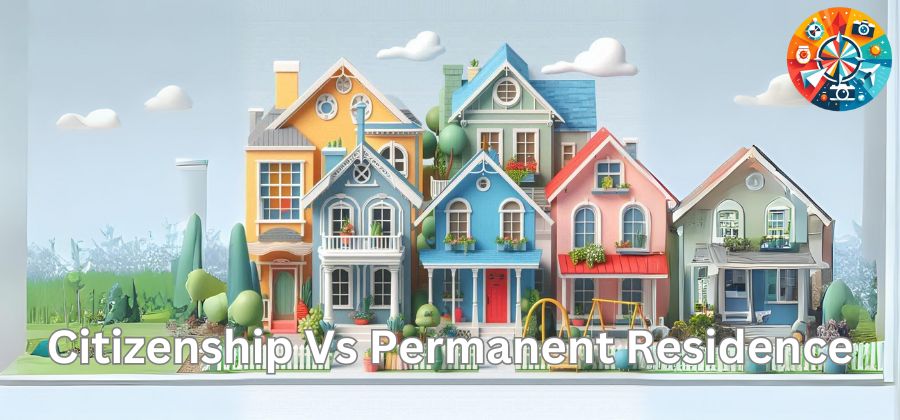
The difference between citizenship vs permanent residence is loud in the rights and requirements to be a resident or citizen of a country.
This is manifest in the right to vote and be voted for, the right to run for political offices, and consular intervention and protection of an individual overseas.
These features draw the line between citizenship vs permanent Residence however, there is more to be discussed about
In case you’re in the thoughts of choosing whether to apply for permanent residence or citizenship in any country or you seek clarity between citizenship vs permanent residence, here is your answer.
Keep reading to find out the true meaning of both words, most importantly you’ll know the privileges you stand to get as a citizen or a permanent resident and their main differences.
Meaning Of Citizenship vs. Permanent Residence
For short, citizenship is the freedom to reside, work, and move about in a country by the right. The right is primarily by birth but it can be obtained by Naturalisation, descent, registration, and more depending on the citizenry permit of the country.
Whereas permanent residence is the legal right to live in a country for an indefinite time to leave so long as the terms of residency are being met you’ll be entitled to enjoy some fundamental human rights however, restricted in some privileges compared to a citizen.
Types of Citizenship and Permanent Residence
The area of permanent residency and citizenship depends on the methods or conditions through which it was obtained, here are a few major forms of permanent residency and citizenship:
Types of Permanent Residency
Here are the basic types of residency that we have:
Regular Permanent Residency
this is the type of permanent residence you obtain by acquiring a Green Card from the country. Countries like the United States, Canada, and Australia issue this kind of permanent residency and it entails that you remain in the country and adhere to taxation to retain the status.
Family-Sponsored Residency
Family members such as father, mother, and siblings can sponsor and be sponsored to permanent residents in another country if they’re buoyant. Countries like the US permit this kind of permanent residency.
Employment-Based Permanent Residency
This is a great way of becoming a permanent resident in any country of your choice. Many countries give job offers with permanent residency opportunities to immigrants.
Permanent Residency by Investment
Real estate is a big deal of a business that’s not going anytime soon. It’s so substantial that some countries offer permanent residence permits to investors with substantial amounts invested into it from abroad.
In America, the EB-5 program offers the opportunity to become permanent residents.
Permanent Residency by Nomination
In some countries like Canada, some territories can nominate an individual with exceptional ability or skills to love with them with an indefinite time to leave. That’s Because your skills are adding value to these provinces.
Types of Citizenship
Citizenship is primarily by birth however, there are other ways in which you can become a citizen of a country such as:
Citizenship by Birth
This is also called birthright citizenship. In this case, you were born into being a citizen of the UK. You don’t need any legal documents or to be present in the country for a specific time to maintain your status.
Citizenship by Descent
Another level of citizenship that’s quite close to birthright is by descent or blood. This type of citizenship is obtained when one or both parents are a citizen of the adopting country. This is also known as “jus sanguinis” citizenship.
Citizenship by Naturalisation
You can become a citizen by Naturalization. This is obtained from a permanent residence path, also, you’ve stayed for a certain number of years you’ve met language requirements, and have passed the life test of the country.
The British offer this kind of citizenship.
Spousal or Marriage Citizenship
an easier way to become a citizen of a country is by marriage or legal relationship with a citizen. All the rights of citizenship are at your disposal. However, there are requirements and rules to obtaining spousal and marriage citizenship.
Citizenship by Adoption
This is when a child is adopted by a parent who’s a citizen of a country. It’s similar to citizenship by birth only that a child becomes a citizen by adoption.
The child is from a different country. There are more ways not obtaining citizenship, please, feel free to.
Citizenship Vs Permanent Residence What’s the Difference
The point black difference between a citizen and a permanent resident is based on the privileges and rights you gain by your status. It also involves the right to carry the passport of the country and the residency requirements.
Here’s a comprehensive summary of the distinct difference between citizenship vs permanent residence:
#1. Right to Passport
Citizens get a passport while permanent residents don’t. The citizens of a country have the country’s passport which enables them to travel within, to, and from the country with a special verification process.
A permanent resident is issued a resident permit card and is subject to making available required documents to make certain travel in or around the country.
#2. Rights to Vote
Citizens have the right to Vote and be voted for as permanent residents don’t. The ability to participate in universal adult suffrage is worth the citizens while the permanent resident doesn’t participate even in any political appointment or office.
#3. Residency Rights and Requirements
The most glaring notice between a citizen and a permanent resident is seen in what it takes for an individual to continue staying in a country. Such as minimum absenteeism and meeting certain requirements.
A permanent resident must meet the language proficiency test and life test of a country and must prove that they have been without a criminal record for at least 10 years.
Citizens are not subject to minimum or permanent absenteeism and can stay away from their country for as long as they want but a permanent resident may lose their status doing the same.
FAQs
How can I obtain citizenship?
Permanent residency is a pathway to citizenship. It’s by staying up to a reasonable number of years that you can process for citizenship status. That should be after you’re grounded and prepared for its requirements.
Citizenship vs. permanent residency which is best?
Citizenship is preferred to permanent residency. In permanent residency, you’re subject to conflicting laws whereas there’s so much you can do. While a citizen is free and can do everything lawful and has unending advantages.
Conclusion
As a citizen, you own the place while a permanent resident rents the place, and the status is preserved by strict adherence to dos and don’ts.
Even as such, you stand to gain a lot from being a permanent resident but much more as a citizen.
You can be a citizen through various means; however, naturalization is most popular – not saying others aren’t good. Still, it boils down to what you aim to achieve, good luck.







